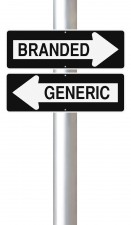
Generic vs Branded drugs via Shutterstock
Given the cost of health care in the US, one would expect our health care statistics to reflect better outcomes but that is not really so, at least for the average person.
Instead, the American College of Physicians (ACP) finds that a large cost is because expensive therapeutic options prevail when equally effective generic drugs are widely and very cheaply available by comparison. Writing in the Annals of Internal Medicine, the ACP Clinical Guidelines Committee conducted an extensive literature review analyzing relevant data and findings from 2500 publications in an attempt to answer five questions with regards to the use of generic medications.
Here are the key issues.
1) How commonly are brand-name medications used when a generic version is available?
Researchers uncovered a trend for common chronic conditions, where clinicians appeared to offer their patients newer drug therapies, which incidentally were more expensive than their generic equivalents. What's interesting is that these expensive prescriptions were given even in cases where clinical practice guidelines recommended otherwise.
For example, in Desai et al study of commercially insured patients with diabetes, 35% of patients initiating therapy with an oral hypoglycemic drug did not receive recommended initial therapy with metformin. Comparing costs of the newer alternatives that patients were offered, an estimated US 1,120 dollars per patient annually could have been saved by prescribing metformin.
2) How does the use of generic medications influence adherence?
With regards to drug compliance, the majority of the studies analyzed reported that generic drugs resulted in significantly higher long term adherence after treatment initiation versus brand name drugs. Essentially, those paying big bucks for brand name therapies were nearly twice as likely to abandon their course of treatment, compared to their generic using equivalents.
3) What is the evidence that brand-name and generic medications have similar clinical effects?
For FDA approval a generic drug must demonstrate bioequivalence to its brand name analogue. Bioequivalence refers to the absence of a significant difference in the availability of the active ingredient at the site of drug action. However, generics are not required by the FDA to be therapeutically equivalent, which is a point of concern for many clinicians and patients.
The ACP committee found that with the exception of a few drugs (namely ophthalmic agents, the antidepressant bupropion, and thyroid hormone), most of the peer reviewed evidence indicated that generic drugs are as effective as their brand-name counterparts with regard to clinical outcomes.
4) What are the barriers to increasing the use of generic medications?
Patient and physician perceptions on the safety and efficacy of generic brands was at the root of this issue. Though a national survey revealed that a majority of patients believed generics to be less expensive, more valuable than brand name drugs, and agreed that more Americans should be using them, in reality only 36% highlighted a preference to generics when polled.
Compounding the issue, approximately 25% of physicians express concerns about the safety and efficacy of generics and indicated a preference not to use these drugs themselves or for their family. The authors attribute this to a lack of awareness of the regulatory process that generic drugs are subjected to in order to ensure safety and efficacy. Interestingly, 5 of the top 10 manufacturers of generics are actually brand-name pharmaceutical companies.
Patient requests for brand name drugs, despite the availability of generic alternatives, was also cited by physicians as a contributing factor to the growing issue. This highlights the need for education and enlightenment on both sides of the fence, with doctors and patients requiring an explanation of the value of generics as more than just a backup plan, but rather a viable first line therapeutic agent for many diseases.
5) What strategies can be used to promote cost savings through greater generic medication use?
ACP guidelines suggest a multifactorial approach, aiming to reach physicians, patients, insurance companies and policymakers, all key players involved in the issue. Suggestions included using continuing medical education to better inform physicians on the benefits of generic drugs, providing free samples of generic medications, patient targeted educational interventions, the use of incentives and/or financial penalties to limit prescriptions that may favor brand name drugs, as well as policy reform.


